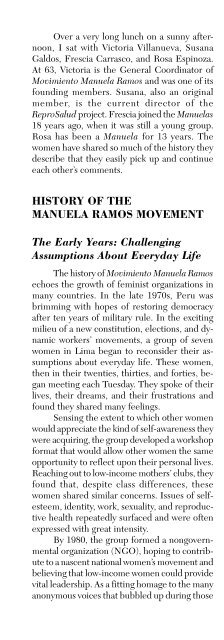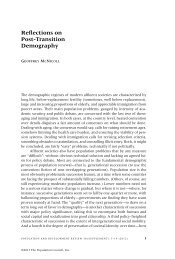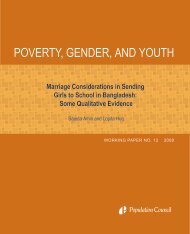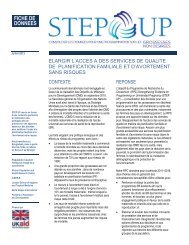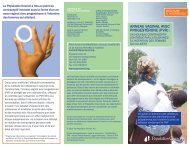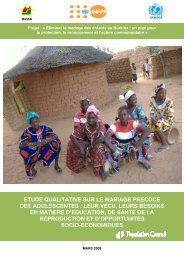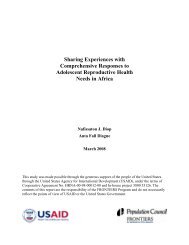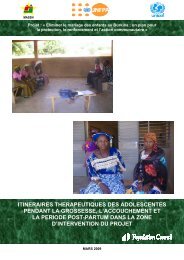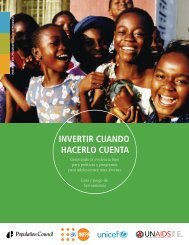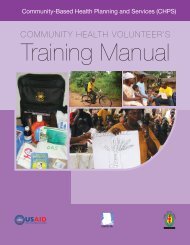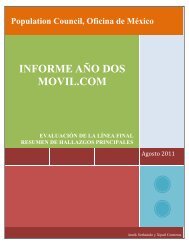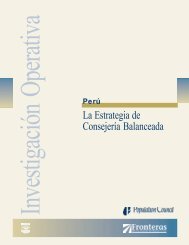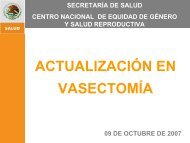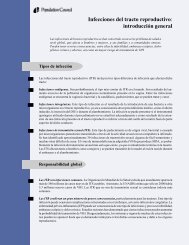QCQ# 10 Alone You are Nobody, Together We Float: The Manuela ...
QCQ# 10 Alone You are Nobody, Together We Float: The Manuela ...
QCQ# 10 Alone You are Nobody, Together We Float: The Manuela ...
You also want an ePaper? Increase the reach of your titles
YUMPU automatically turns print PDFs into web optimized ePapers that Google loves.
Over a very long lunch on a sunny afternoon,<br />
I sat with Victoria Villanueva, Susana<br />
Galdos, Frescia Carrasco, and Rosa Espinoza.<br />
At 63, Victoria is the General Coordinator of<br />
Movimiento <strong>Manuela</strong> Ramos and was one of its<br />
founding members. Susana, also an original<br />
member, is the current director of the<br />
ReproSalud project. Frescia joined the <strong>Manuela</strong>s<br />
18 years ago, when it was still a young group.<br />
Rosa has been a <strong>Manuela</strong> for 13 years. <strong>The</strong><br />
women have sh<strong>are</strong>d so much of the history they<br />
describe that they easily pick up and continue<br />
each other’s comments.<br />
HISTORY OF THE<br />
MANUELA RAMOS MOVEMENT<br />
<strong>The</strong> Early Years: Challenging<br />
Assumptions About Everyday Life<br />
<strong>The</strong> history of Movimiento <strong>Manuela</strong> Ramos<br />
echoes the growth of feminist organizations in<br />
many countries. In the late 1970s, Peru was<br />
brimming with hopes of restoring democracy<br />
after ten years of military rule. In the exciting<br />
milieu of a new constitution, elections, and dynamic<br />
workers’ movements, a group of seven<br />
women in Lima began to reconsider their assumptions<br />
about everyday life. <strong>The</strong>se women,<br />
then in their twenties, thirties, and forties, began<br />
meeting each Tuesday. <strong>The</strong>y spoke of their<br />
lives, their dreams, and their frustrations and<br />
found they sh<strong>are</strong>d many feelings.<br />
Sensing the extent to which other women<br />
would appreciate the kind of self-aw<strong>are</strong>ness they<br />
were acquiring, the group developed a workshop<br />
format that would allow other women the same<br />
opportunity to reflect upon their personal lives.<br />
Reaching out to low-income mothers’ clubs, they<br />
found that, despite class differences, these<br />
women sh<strong>are</strong>d similar concerns. Issues of selfesteem,<br />
identity, work, sexuality, and reproductive<br />
health repeatedly surfaced and were often<br />
expressed with great intensity.<br />
By 1980, the group formed a nongovernmental<br />
organization (NGO), hoping to contribute<br />
to a nascent national women’s movement and<br />
believing that low-income women could provide<br />
vital leadership. As a fitting homage to the many<br />
anonymous voices that bubbled up during those<br />
early workshops, the group chose the name<br />
Movimiento <strong>Manuela</strong> Ramos (the <strong>Manuela</strong><br />
Ramos Movement). <strong>The</strong> name <strong>Manuela</strong> Ramos<br />
is considered so ordinary and common as to signify<br />
“Everywoman,” somewhat akin to Fulana<br />
in Brazil or Jane Doe in the United States<br />
<strong>The</strong> <strong>Manuela</strong>s’ strategy was to train women<br />
community leaders in Lima’s barrios (marginal<br />
urban <strong>are</strong>as). As Frescia, currently the coordinator<br />
of the <strong>Manuela</strong>s’ health program, explains,<br />
“<strong>We</strong> called it training because we never found a<br />
better name, but they were really reflection<br />
workshops.” What they called the “basic course”<br />
was actually quite intensive: almost 40 hours, two<br />
afternoons a week for eight weeks, with three<br />
main themes:<br />
• Identity: sexuality, the body, and male/female<br />
relations;<br />
• Self-worth: women’s rights and history,<br />
emphasizing the “double-shift” (paid work<br />
outside the home plus unpaid labor within<br />
the home) and the fact that most women<br />
have “two bosses”; and<br />
• Organization: teaching women skills they<br />
need to advocate for change.<br />
3


